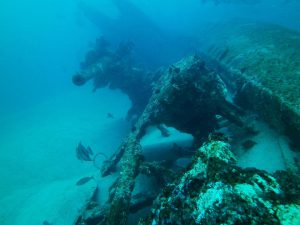
“It’s a submarine,” I was thinking, unmistakably a submarine, sitting on the bottom of the ocean 30 meters (100 feet) below the surface. I was descending from the dive boat to the U-85, a German submarine sunk just 20 kilometers (12 miles) off Cape Hatteras, North Carolina. The U-85 was the first German U-boat to be sunk off the U.S. coast during World War II. As I descended and looked down through the blue-green water, I could see the conning tower on top of the cigar shaped boat. The deck gun was still raised as it was on the sub’s last day above the water. It was 1994, my first dive to the U-boat, and I was hooked on wreck diving. I have been back to the U-85 many times since that first dive and visited many other the other wrecks off our shore.
They call the waters off the Outer Banks the Graveyard of the Atlantic for good reason. Hundreds of ships have sunk due to the treacherous currents, unpredictable weather, and wars. The adventure of scuba diving the “Ghost Fleet of the Outer Banks” attracts divers from all over the world. As a NAUI Instructor, I have been diving these shipwrecks for over 20 years. My instructor, Jim Bunch, a scuba diving legend, instilled in me a love for North Carolina wreck diving. As owner the Roanoke Island Outfitters and Dive Center, I dive the same wrecks over and over, and I never get tired of them.
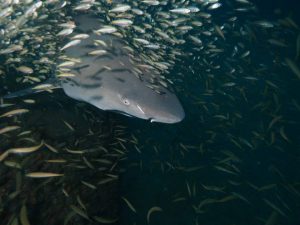
Wreck diving does take more training and experience to dive safely than reef diving. Currents, waves, low visibility, and tides need to be taken into consideration. The U-85 is considered an advanced dive. With a depth of 30 meters (100 feet) combined with the always present currents and less than ideal visibility, only divers who are with a dive leader or have the necessary experience should attempt this dive. There are many other shipwrecks in our area to dive for adventure and fun, with depths appropriate for all levels of experience.
More shipwrecks are discovered every year, which fuels interest. The National Geographic map of the “Ghost Fleet,” printed in 1970, locates over 500 wrecks in and around the Outer Banks.
Crockett Farrow, a local diver and waterman with over 30 years of experience, marked a wreck that he wanted to come back to and explore. It took 20 years, but in 2002, Crockett and two local professionaldivers were able to dive on it
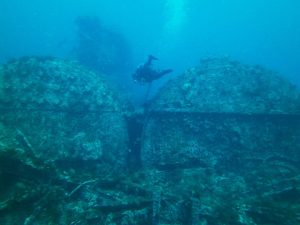
and discovered that it was the wreck of the U.S. Coast Guard Cutter Bedloe. The Bedloe was sunk in 1944 during a hurricane. “When we dove her, she was intact, with all portholes, deck lights, and guns still in place,” Crockett stated. Bu he also noted that in 2003, when word went out what he had found, other divers started exploring her and the Bedloe has since been plundered of many of these artifacts.
Not all shipwrecks met their end due to extreme conditions or war. Some were scuttled on purpose to provide artificial reefs to attract marine life. The ADVANCE II, a 56-meter (185-foot) vessel was sunk in 1994. She lies about 13 kilometers (8 miles) from the Oregon Inlet buoy in approximately 24 meters (80 feet) of water with the deck at 20 meters (65 feet) and is a favorite site for recreational divers from beginner to advanced levels of experience.
While most of our wreck dive sites are accessed by a boat, there are numerous wrecks located just a short swim off of our beaches. One of my favorites is the “Triangle Wrecks,” located 90 meters (100 yards) off the beach at the Second Street
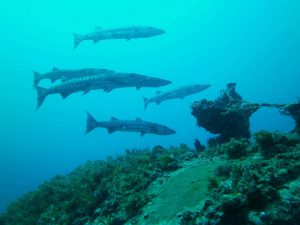
beach access in Kill Devil Hills. Two ships had the unfortunate fate of running aground here, next to each other, just two years apart. The Kyzickes, an 89-meter (292-foot) tanker carrying crude oil went first in 1927. She was followed by the Carl Gerhard in 1929. The Carl Gerhard was a 74-meter (244-foot) freighter carrying over 1500 tons of crushed gypsum rock. She was floundering in the surf when she struck the Kyzickes, which she cut in two, and sank. The two sunken ships form a triangle shape on the bottom, hence the name. To access these wrecks, you need to be able to swim or use some sort of floatation device such as a kayak or paddleboard to reach the site. Depth for this wreck site is only 6 meters (20 feet), ideal for newly certified divers or those wishing to experience a shipwreck without obtaining an advanced certification.
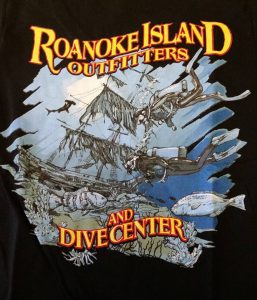 Whatever the level of training, the Outer Banks has a dive to fit your experience and interests.
Whatever the level of training, the Outer Banks has a dive to fit your experience and interests.
Roanoke Island Outfitters and Dive Shop, located in Manteo is the Outer Banks only year round dive shop and NAUI training facility. We specialize in wreck diving and offer Dive Charters on our dive boat, “Down Time,” and guided shore dives to these and many other shipwrecks. We teach all levels of NAUI dive classes. Call for information: 1 252-473-1356; find us on Facebok; or visit www.roanokeislandoutfittersanddivecenter.com


